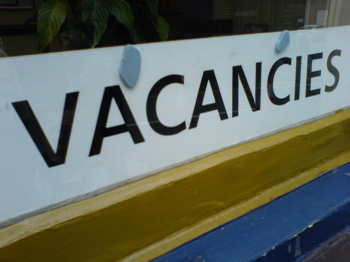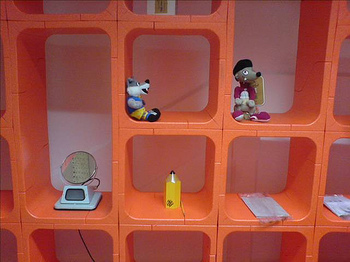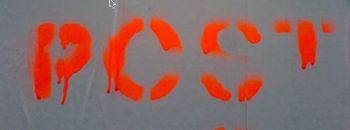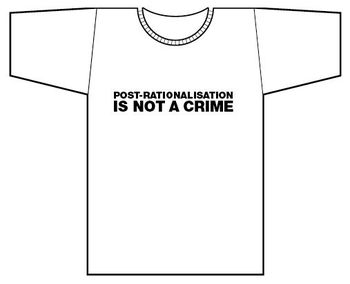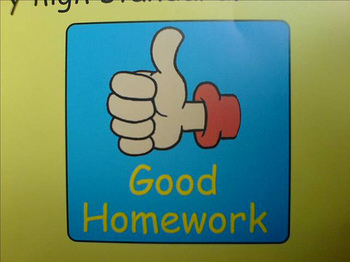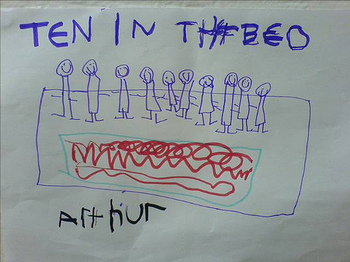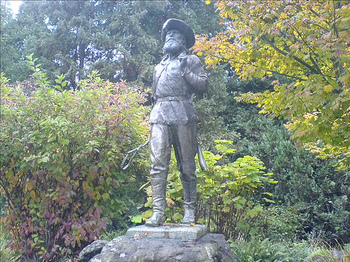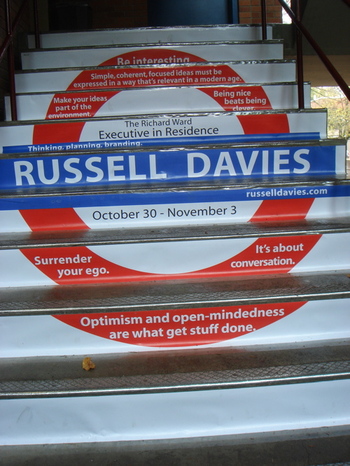And while we're talking about Radio 4 you should also check out the series More Or Less. It's all about numbers, including features on surveys, probability and the dangers of spotting patterns in random things.
Russell Davies
As disappointed as you are
About | Feed | Archive | Findings | This blog by email
ethnographies?
Someone's got in touch to find out if there's a research company or someone out there who can help with a project like this:
"We are looking to find a company/group of people that can help us conduct some self-directed ethnographies. Ideally, we would like to create these ethnographies online in a blog (or similar) format to start. From there we will follow up with some face to face video ethnography work. Finally, we need to be able to conduct this project globally, (North America, South America, Europe and Asia). Help!"
I suggested OIA, but they weren't convinced. So if anyone's done something like this before and wants to do it again for a global brand in a hurry please leave info in the comments or email me and I'll pass your details on.
November 24, 2006 in the job | Permalink | Comments (9) | TrackBack (0)
another job
Fallon are looking for a senior planner. Details here.
November 19, 2006 in the job | Permalink | Comments (0) | TrackBack (0)
cheap hotel in manchester?
I'm off to Love again next week. Can anyone recommend a cheap but decent hotel in Manchester? When someone else was paying I always liked staying at Malmaison but now it's my own money I'm not so sure.
November 13, 2006 in the job | Permalink | Comments (3) | TrackBack (0)
in praise of overthinking
Whenever you want to make a planner shut up the approved thing to say seems to be "you're overthinking'.
Creatives are very prone to this. But everyone does it.
I hate this. Not only is it a dumb thing to say but it's also hugely self-congratulatory. It always suggests that you, you silly dear planner, have got lost in the thickets of your little intellectual shrubbery wheras I, the mighty empath of creativity have divined the way forward through instinct alone. I am never confused between forest or trees because I stand like a mighty redwood of intuition, master of the whole landscape, never thinking too little and never, ever thinking too much. And it is clear to me, as clear as a freshly minted contact lens, that the moment I stop understanding something is the moment it becomes overthought.
I exaggerate. But you know what I mean. It's a synonym for complicating. Obfuscating. Confusing.
But overthinking is a much maligned art.
Overthinkers are exactly what we need more of. Because all the expected answers have already been had, by all the people who just think the industry standard amount of thinking. We need people who can't leave a problem alone, who will persist in gazing at and thinking about something until it yields some unexpected truths.
My favourite piece of fiction is a masterpiece of overthinking - Nicholson Baker's The Mezzanine. Some of my favouite writing on the web is all overthinking. City Of Sound is a great example. Or this great overthinking about meat from Schulze and Webb. Or Standinaqueue. And one of the reasons I like working with jeffre is he can't help but overthink everything, and it's always brilliant.
I can already hear people saying it - come on russell, you're overthinking overthinking.
But I don't think I am, I think overthinking is that fantastic ability some people have to really examine, illuminate and understand the value, joy and interestingness in something that everyone else is already bored with, or ignores because they assume all the thinking has been done. That's a core skill for planners, designers, all sorts of people because, let's face it, a lot of the time, we're being asked to find something interesting to say about something that no-one thinks has much value. And it helps if we can find real value rather than just make stuff up.
It's the overthinkers that notice things. That think beyond the expected. I feel another t-shirt coming on; overthinking is not a crime.
November 13, 2006 in the job | Permalink | Comments (17) | TrackBack (1)
he's done it again
Richard doesn't post all that often but when he does it's always brilliant. This picture under the heading 'the truth about great planning' and accompanied by the Einsein quote 'Theory cannot be fabricated out of the results of observations - it can only be invented' sums up in one image most of what I've been trying to say for the last five years.
It's doubled my intent to get these t-shirts made when I get back to London. Look for them soon.
November 09, 2006 in the job | Permalink | Comments (8) | TrackBack (1)
how to be interesting
While I was at the U of O I kept going on about how the core skill of any future creative business person will be 'being interesting'. People will employ and want to work with (and want to be with) interesting people.
And since I’d spent quite a lot of time telling them all the things they should stop doing I’d thought I’d try and teach something useful. Since I don't actually know anything useful I had to make something up. Which is below. It takes about 10 minutes to teach but it’ll take a lifetime for people to work out if it works or not, and by then I’ll be long gone. Ha!
I’ve based it on two assumptions:
The way to be interesting is to be interested. You’ve got to find what’s interesting in everything, you’ve got to be good at noticing things, you’ve got to be good at listening. If you find people (and things) interesting, they’ll find you interesting.
Interesting people are good at sharing. You can’t be interested in someone who won’t tell you anything. Being good at sharing is not the same as talking and talking and talking. It means you share your ideas, you let people play with them and you’re good at talking about them without having to talk about yourself.
The marvelous thing about tinterweb is that it’s got great tools for being interested and great tools for sharing. So I’ve used them a lot. It should, of course, be obvious that there are many other ways to be interesting. Some of them don't involve computers at all. These are just 10 things, and if you do them you’ll get more interesting. Or at the very least you’ll start practising the skills of being interesting.
It's sort of didactic, bossy even, but it's supposed to be instructional, rules you can follow. If you do them, and send me evidence that you’ve done them for three months, then I’ll send you a marvelous ‘I’m More Interesting Than I Was Three Months Ago’ certificate.
1. Take at least one picture everyday. Post it to flickr.
You should carry a camera with you. A phonecam will do. The act of carrying a camera, and always keeping an eye out for a picture to take changes the way you look at the world. It makes you notice more things. It keeps you tuned in.
Posting it to flickr (or other photosharing sites) means that you’re sharing it. It’s in public. This will make you think a little harder about what you shoot and it might draw you into conversation about your pictures.
2. Start a blog. Write at least one sentence every week.
This is pretty easy. If you just did this much I’d be disapppointed. You should write more sentences. Or you should write one true sentence. But I suspect that you won’t be able to limit yourself to just one sentence, I suspect you’ll get bitten and want to do more.
It’s easy to knock blogging as a kind of journalism of the banal but in some ways that’s its strength. Bloggers don’t go out and investigate things (mostly) they’re not in exciting or glamorous places, they’re not given a story, they have to build one out of the everyday lives they lead. And this makes them good at noticing things, things that others might not have seen. And being a blogger, feeling the need to write about stuff makes you pay attention to more things, makes you go out and see more stuff, makes you carry a notebook, keeps you tuned in to the world.
3. Keep a scrapbook
I’ve talked about this before. It’s good. Do it.
4. Every week, read a magazine you’ve never read before
Interesting people are interested in all sorts of things. That means they explore all kinds of worlds, they go places they wouldn’t expect to like and work out what’s good and interesting there. An easy way to do this is with magazines. Specialist magazines let you explore the solar system of human activities from your armchair. Try it, it’s fantastic.
5. Once a month interview someone for 20 minutes, work out how to make them interesting. Podcast it.
Again, being interesting is about being interested. Interviewing is about making the other person the star; finding out what they know or think that’s interesting. Could be anyone, a friend, a colleague, a stranger, anyone. Find out what’s compelling about them. Interviewing stops you butting in too much and forces you to listen. Good thing to practice. (And it's worth noticing the people who are good at it.) Podcasting is sharing. Sharing is something you must get used to.
6. Collect something
It could be anything. It could be pictures of things. But become an expert in something unexpected and unregarded. Develop a passion. Learn how to communicate that to other people without scaring them off. Find the other few people who share your interest. Learn how to be useful in that community.
7. Once a week sit in a coffee-shop or cafe for an hour and listen to other people’s conversations. Take notes. Blog about it. (Carefully)
Take little dips in other people’s lives. Listen to their speech patterns and their concerns. Try and get them down on paper. (Don’t let them see. Try not to get beaten up.) Don’t force it, don’t hop from table to table in search of better eavesdropping, just bask in the conversations that come your way.
8. Every month write 50 words about one piece of visual art, one piece of writing, one piece of music and one piece of film or TV. Do other art forms if you can. Blog about it
If you want to work in a creative business (and before long most businesses will be creative businesses) you’ll have to get used to having a point of view on artistic stuff. Even if it’s not very artistic. You’ll have to be comfortable with expressing an opinion on things you don’t know how to make or do, like music or writing. You get better at that through practice. And through sharing what you’ve written.
9. Make something
Do something with your hands. Create something from nothing. It could be knots, it could be whittling, Lego, cake or knitting. Take some time to get outside your head. Ideally, make something you have no idea how to do. Get something from Make and try it, assuming you’ll screw it up the first time. People love people who can make things. Making’s the new thinking. Share your things on the your blog, or, if you’re brilliant maybe you can share them on etsy.
10. Read:
Understanding Comics - Scott McCloud
The Mezzanine - Nicholson Baker
The Visual Display Of Quantitative Information - Edward Tufte
All these books are good for their own reasons but they’re also good examples of people who are really interested in stuff that others think of as banal and who explain it in a way that makes you share their passion. That's good.
And that's it.
Anyone got any others?
November 07, 2006 in the job | Permalink | Comments (69) | TrackBack (22)
building creative generalists
I’ve just spent the last week at the University of Oregon. Working with undergraduate students and faculty at the advertising programme at the school of journalism. I was being an ‘executive in residence’.
The U of O is in Eugene, though it might make more sense to say the U of O is Eugene. It’s a lovely place. They spend a lot of time telling you about all the bits of Eugene that inspired various things on The Simpsons. (see above) And both the kids and the faculty were really nice and really welcoming. Smart kids too (is that too patronising?) Really engaged, enthusiastic and imaginative.
It’s very intimidating to arrive somewhere and come face to face with a large graphic of your name, with a collection of your 'sayings' like you’re a third world despot. Nice of them to make the effort though. (It’s also slightly embarrasing to be caught taking pictures of a graphic about yourself to put on your blog. That probably defines self-involved.)
Anyway, to the point.
It’s a long time since I’ve spent much time in an educational environment and it made me think about all sorts of things.
The students at the U of O are organised into a little volunteer ad agency called Allen Hall Advertising. They do pretty decent work for real clients and it must be an invaluable way to learn. They let me sit on an AHA meeting but it wasn’t long before I found myself starting to shatter their young dreams.
Because, in creating AHA, they’d very accurately recreated the infrastructure and heirachies of JWT in 1986. (Not specifically, but you know what I mean.) They were operating in a way that even big dumb agencies are trying to stop doing. They were preparing themselves for a world of work that doesn’t exist any more, or at least, won’t exist soon. I suggested, probably thoughtlessly, that they not worry about who was an ACD or an account person and start thinking about creative business problems they’d like to solve and start solving them. In small multi-disciplinary teams. Quickly.
And it soon becomes apparent that this issue goes a lot broader. Their course is designed to churn out mini-art directors, mini-account people, mini-planners for a world that increasingly just wants creative generalists. We have no idea what the world of work will be like or 5 or 10 years, but I suspect it won’t be like JWT in the 80s.
(Though I guess the lucky thing about advertising is it’s quite a flexible activity anyway so it’s not like they’re learning anything that won’t be useful. They’re not studying to be steam engineers or top hat makers, but it’s not so much about the skills they learn, it’s how they learn to apply them.)
Anyway.
The faculty at the U of O are smart enough to have figured this out and they’re working against the institutional friction to create something appropriate for the 21st century (I suspect they got me in to cause this sort of trouble, maybe even to write a post like this) but it’s going to be a struggle. We’re heading for a multi-disciplinary world and that butts right up against a university business model. If I were preparing myself for my job right now I’d do classes in film editing, poetry, statistics, anthropology, business administration, copyright law, psychology, drama, the history of art, design, coffee appreciation and a thousand other things. Colleges don’t want you doing that, that destroys all their efficiencies, but it’s what they’re going to have to work out.
(Good signs include a course that they're going to teach about Curiosity, that sounds like something I’d like to have done.)
I suggested the best thing they could do is get in touch with Steve at Creative Generalist and get his advice so Steve, you might be getting a call.
But everyone keep your eye on the U of O, with some good luck and some hard work they might transform themselves from a pretty decent ad school into a supplier of high-class creative generalists.
Interestingly, as well as having visited the U of O last week, I’m also on the board of VCU adcenter and I’ve been exchanging emails with people there about a similar dilemma. They’ve been watching the world change too and have created a new track called ‘Creative Brand Management’- this is a response to the idea that traditional MBAs are really poorly equipped to handle the increasingly creative requirements of the modern business world - having ideas, managing creative projects, working with aesthetic decisions, etc. In essence these are the brand managers, communications managers etc of the future. I guess they’re like regular marketing students but they’re more used to collaboration with creative people etc.
This seems like a smart idea to me but obviously it’s quite a new idea and most client organisations have never heard of adcenter so they’re looking for help and ideas in helping these people get out into the world. Where can they get internships? How should they market themselves? All that sort of stuff. One of the students is thinking about all this and emailed me with questions. Sadly my one year as a client doesn’t really equip me to answer them very well, so I said I’d try and help by putting some of the questions up here.
If anyone has any views or suggestions I’d very grateful if you’d post them in the comments. These are the questions:
1. For the CBMs, part of the struggle is the relative anonymity of the Adcenter in the client world. From a typical client perspective, what do you think is the most attractive way to describe the educational process as it differs from traditional B-schools? Should this "sell" work its way onto a student's resume, or is there another way to make these points to an employer who may have zero prior knowledge? What types of materials should complement our resume as a track-information provider (i.e., a thorough Web site, a downloadable brochure, etc.)?
2. What, specifically, do you look for in the resume of someone who will work on your brand team? Do you expect a portfolio in addition to a resume? If so, what should be included?
3. We want to ensure that the title "Creative Brand Managers" isn't too limiting. Ideally, as graduates from this program, we will be equipped to manage a brand in myriad roles, including communication manager, marketing manager, project manager, brand analyst, among many others. Is the term "Creative Brand Manager" misleading to a recruiter? How explicit should we be with the title? What types of positions would you hire a student with a masters in "Creative Brand Management" for?
4. What are the skills mandatory from a new hire to work on anything that touches your brand? What are some ideal skills you'd like to see but rarely do?
5. In closing, how can we go about having companies find us in the future? What can we do to spread the word about this one-of-a-kind program?
So that's it. Any suggestions or thoughts very welcome.
November 06, 2006 in the job | Permalink | Comments (15) | TrackBack (3)
distributed village notices
You'll see a third column has arrived over on the left. This has been a two-column blog for a long time so it looks a little odd to me, but change is good and it seems to work on ebcb so I hope it'll work here. The idea is that it'll be a place where all of you lovely people can get notices and things posted - conferences, jobs, questions etc - and where I can keep track of some of the ongoing projects like Post Of The Month. It's an experiment. We'll see.
October 06, 2006 in the job | Permalink | Comments (2) | TrackBack (0)


